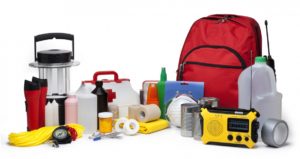
1. Get An Idea Of The Risks To Your Home
It is best to follow updates on the hurricane heading your way through your local news or through FEMA’s coverage center. The National Weather Service will also provide charts indicating the areas that should expect to have flooding and the estimated wind speeds that your area will encounter. Usually, if you are in an area that is anticipating hurricane-force winds and or in an area with large bodies of water, evacuation recommendations and orders will be put in place by your states local government. You should determine whether you should expect floods inside of your home and familiarize yourself with what kind of damage occurs at different hurricane category wind speeds. All of these factors will influence your decision to stay and ride out the storm in your home, go to a public shelter, or evacuate elsewhere. FEMA will also provide a list of public shelters and specify which ones will accommodate special needs and or pets. Ensure that you follow the instruction of your utility companies and turn off anything they advise you to turn off.
2. Determine Evacuation Route If You Decide To Evacuate
Anyone who lives in a coastal area that is expecting hurricane force winds will either be evacuated on a mandatory basis or less commonly on a voluntary basis. Storm surge and floods are the top reasons for the fatalities that are associated with hurricanes. FEMA will have a map of your evacuation route so that you know the correct way to leave when everyone else is leaving as well. The roadways can easily become congested and accidents are more likely to happen with the chaos of evacuation before storms. It is imperative that you follow the route you are given by FEMA, as they have intuitively set these routes up so that everyone in the area has a chance to get away from where the storm will be hitting. When no one follows the route they are recommended, it can cause massive traffic hold ups that may result in some people being stuck on the road when the conditions start to deteriorate. Know exactly where you will be going and know how you are going to get there. You should leave as soon as you make the decision to evacuate, as time is of the essence with hurricanes.
3. Stock Up On Supplies If You Decide Not To Evacuate
If you choose to stay in your home and ride out the storm for one reason or another, you should stock up on several things. Just because your area, in particular, does not anticipate hurricane force winds does not mean that your power will not go out for days or even weeks. Depending on your power lines and setup, winds as low as 20 mph can knock out power, and once winds reach over 40 mph you can be sure that crews are not going to be out repairing power lines. You should have a first aid kit handy, enough non-perishable food and water for each person for at least five days, a battery-powered radio (to listen for updates and warnings issued by the NOAA National Hurricane Center) all medications that are needed, and extra batteries. Many people also find that filling up a bathtub or two with water helps with being able to flush toilets when the power goes out. If you have a grill or a generator it is wise to stock up on fuel for both before your local stores sell out of it. When it comes to buying supplies for a storm that is barreling your way, it is best to assume that everyone is in panic mode and that all water, batteries, flashlights, gasoline, generators, grills, and propane will sell out within just hours of a watch being issued.
4. Prepare Your Windows And Doors
At the beginning of hurricane season is the best time to go around your home and check for any weak points in your windows and doors. Ensure that you get all repairs done by a professional and reliable team like ours here at MyHandyMan. Windows with cracks and openings can let in rainwater and will break easier if hit by a projectile. Weakened doors and windows will also put more pressure under the roof which also needs to be protected. Avoid using masking tape on the windows as it is a waste of time and ineffective. Board up windows if you are expecting to have hurricane force winds. If you find yourself without the resources or ability to board up windows, it is better to have a mattress or large piece of furniture up against them during the storm then nothing at all. Additionally, do not only hire our team at MyHandyMan to repair and secure the side of the home that will be facing the direction that the wind is coming toward. Storms are unpredictable and wind shear can result in projectiles flying in all directions. Ensure that there is a functional one-inch deadbolt on all doors to the exterior of your home.
5. Take Steps To Protect Your Roof And Outside Wall Openings
Hurricane force winds have the capability to pull even a healthy roof away from your home. If you are expecting a major hurricane consider purchasing and installing hurricane straps to bolt your roof securely to the rest of your home’s structure. Loose roof tiles or roof shingles can easily become damaging projectiles during the hurricane if you do not seal them with roofing cement. In addition, the underlying material will become contaminated and damage by rain and wind once the shingle blows off. If there are any vents or areas where wires are threading into the home, use high-quality waterproof caulking to seal them. Additionally, do the same with sealing up vents, electrical outlets, hose bibs, places where pipes enter your home, and places where cables go into your home.
6. Prepare Your Trees And Landscaping
It is always better to go through this process at the start of hurricane season, however, you want to ensure that you do it when a storm is headed your way too. Evaluate all of the trees in your yard that stands any taller then you do. Do they have dead sections on them that could become flying projectiles? Trees are one of the top causes of insurance claims after a hurricane passes through. If any trees look unstable then you should make every effort possible to take it down especially if you plan to stay in your home during the storm. Next, after flooding, falling trees are the second leading cause of deaths from hurricanes. Additionally, if a branch flies into your neighbors home or if your tree damages their property, you could be liable for it. If you have plant beds with rocks instead of mulch, consider taking most of the rocks up. Even though bedrocks are not large, they can become flying projectiles that will damage windows, cars, and anything else in their path. Ensure that you take up all of your lawn furniture and plants that are not rooted into the ground as well.
7. Make Or Update Your Home Contents Inventory
Not only will you likely not be able to remember every single significant item that was in your home before the hurricane, but your insurance company is going to want proof that you actually had these things in your home. Writing down everything that you would want to be replaced under your policy and the date that you purchased it prior to when the hurricane hits your area will be extremely helpful if you do have to go through the claims process. Once you take down an inventory, keep it somewhere safe where it cannot get destroyed in the home. Electronically storing it with a family member in another location is an ideal way to ensure that you won’t have an overwhelming claims process should your property sustain damage during the storm.
Should you find yourself in the path of a storm, you can always give us a call here at MyHandyMan in order to help you get your home ready. Our reliable, knowledgeable, and professional team will be here for you throughout storm preparation and restoration efforts when the hurricane has passed.
